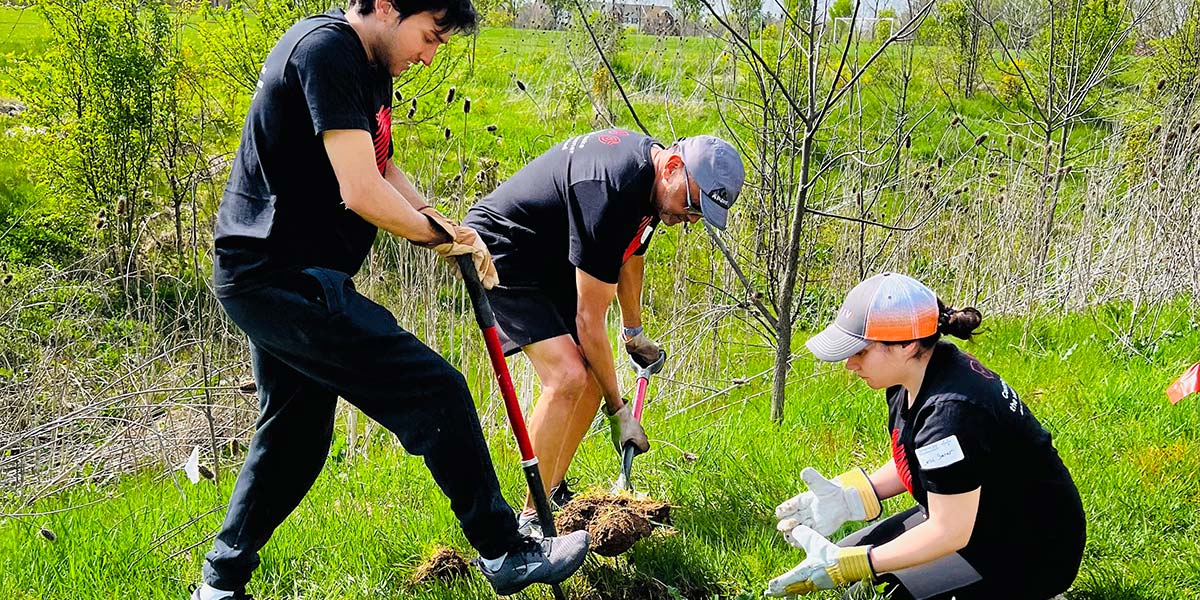Helping Trees Grow the Distance
In the fight against climate change, few resources are as important as trees. Each year, the world’s forests remove approximately 7.6 billion metric tons of CO2 from the atmosphere and sequester it into the ground. Reforestation is an essential tool to achieve a carbon-neutral future, but there is a lot more to successful tree-planting initiatives than meets the eye.
Planting trees the right way
Before beginning a tree-planting project, key questions must be answered: Where is the best place to plant the trees? Which species of trees should be planted? How do we sustainably grow saplings from seed, transport them to the planting site and put them in the ground? And once the trees have been planted, how do we ensure that they are watered and protected as they grow to maturity?
To answer these questions, Aptiv turns to the experts: the nonprofit One Tree Planted. One Tree Planted does not plant trees directly but instead serves as an independent overseer of tree-planting projects across the globe. It raises funds to allocate resources for local organizations and then monitors their progress. To verify each project’s success, One Tree Planted requires regular reports and photos, including updates during seedling production and site preparation and a follow-up report one year after planting.
Key metrics include the total number and species of trees planted, survival rates, the number of permanent and seasonal jobs created, the impact on the community and local water supply, and additional performance indicators based on the objectives of each project.

Not a one-size-fits-all approach
Successful tree-planting projects require a holistic approach that takes into account varying factors specific to each region. After all, the ecological and economic circumstances in the United States and Canada are different from those in Latin America.
The majority of tree-planting projects in North America are coordinated with government agencies such as the U.S. Forest Service. Due to rising global temperatures, trees that are planted today will need to be able to withstand warmer conditions when they have reached maturity 20 to 30 years from now. The impact of forest fires and droughts is another key consideration. Some trees are more resistant to fire than others and are particularly well suited for regions with drier conditions.
In Latin America, tree-planting projects require community involvement to ensure success. Latin America is home to more than 14 million small-holder farmers — who account for about 50 percent of the total agricultural output of the region. One Tree Planted partners with agroforestry initiatives that plant trees as a supplement to existing agricultural infrastructure. Fruit-bearing trees can provide a secondary income source for farmers, provide shade cover for livestock and improve crop yields by helping with soil retention. Working with local farmers to select tree varieties that meet their needs helps ensure such projects’ long-term success.
Looking beyond the numbers
While One Tree Planted has helped plant more than 100 million trees since 2014, some studies suggest that the world needs another trillion trees to achieve carbon equilibrium. But it is important to understand that no matter how many seedlings are planted, the work will never be finished. The focus of these efforts is less about planting a specific number of trees and more about growing healthy, biodiverse forests. Ongoing monitoring and management are essential to cultivating thriving, self-sufficient ecosystems.
A strong business environment needs a strong environment
In 2022, Aptiv planted more than 100,000 trees, representing more than 100 projects, in every region where we operate. For example, an Aptiv facility in Sannicolau, Romania, gave every employee a fruit tree to plant in their yards and gardens, and Aptiv Mexico helped plant more than 40,000 trees in Mexico’s Sierra Tarahumara region to support the restoration of 41,000 square kilometers of hydrological micro basins.
As part of our commitment to the U.N.-backed Science Based Targets initiative, we recognize that nature-based solutions are an essential part of the effort to mitigate the risks of climate change. Despite these successes, Aptiv does not claim carbon offsets from our tree-planting projects. So why do we support One Tree Planted? Because we know that tree plantings — when conducted as part of a holistic ecosystem management plan — positively impact the health of the communities where we live and work. And ultimately, what is good for the environment is good for us all.